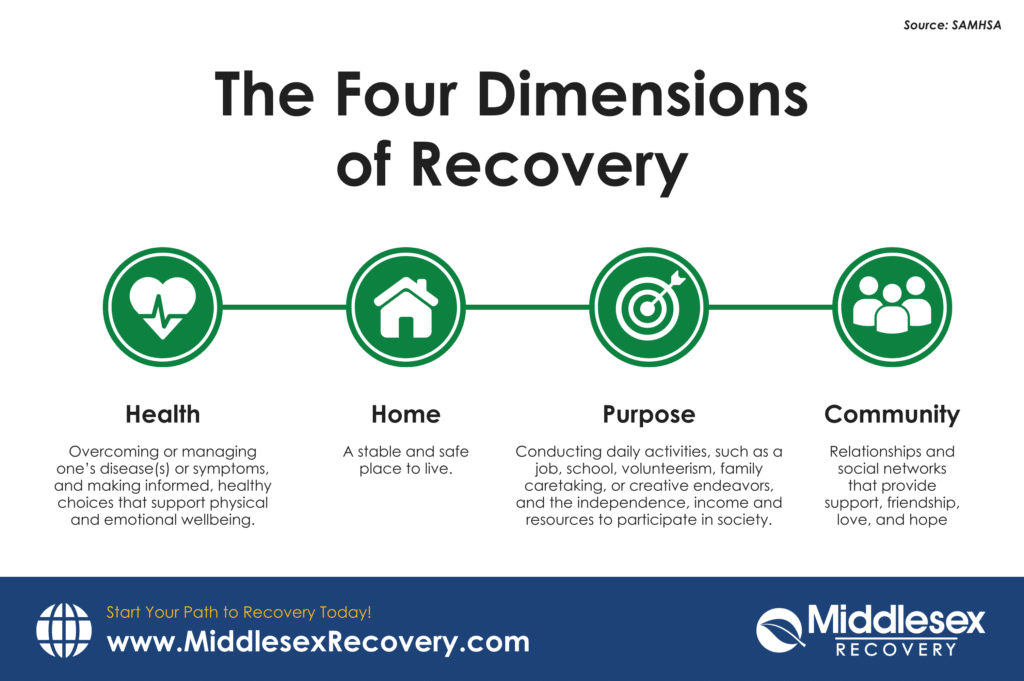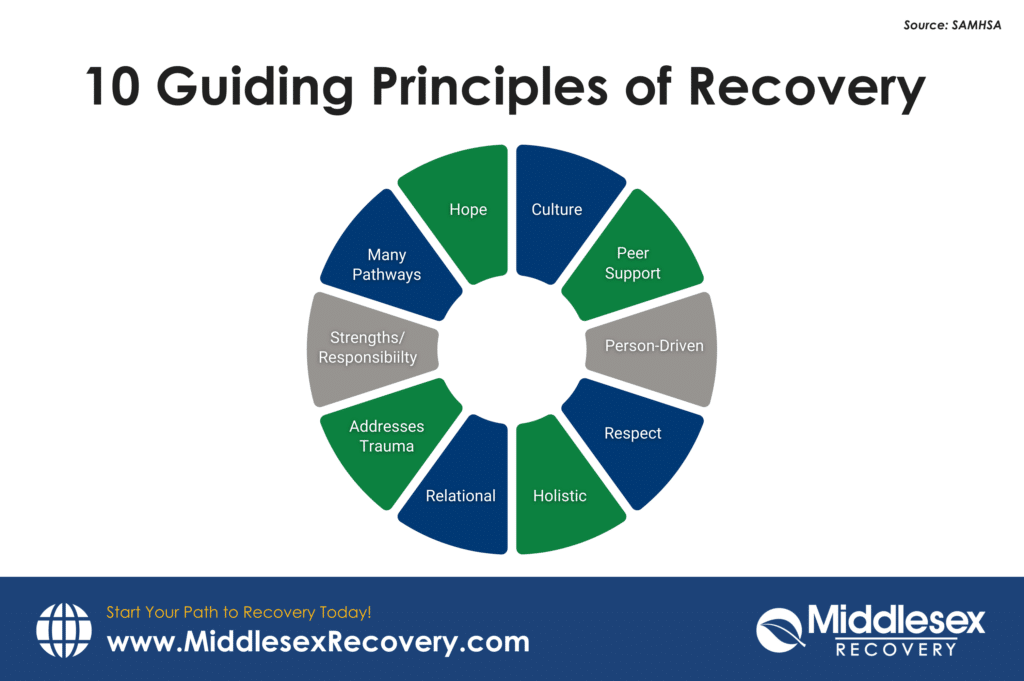
The goal of substance use disorder treatment is to stop the misuse of substances that have progressively spiraled into addiction, affecting you and your loved ones. Recovery, however, extends beyond addiction treatment; it’s a comprehensive process not just focused on abstaining from illicit substances but also on fostering hope and paving the way for a better future.
Recovery empowers you to regain self-control and pursue goals with support, optimism and independence. While each person’s journey to recovery is different, there are four key aspects to achieving physical, mental, professional and social well-being, collectively known as the four dimensions of recovery.

According to SAMHSA, recovery is defined as a process of change through which individuals improve their health and wellness, live a self-directed life, and strive to reach their full potential. To make the most of the treatment and recovery experience, SAMHSA outlines four dimensions of recovery that can help foster a balanced and fulfilling lifestyle.
The first and most important key to lasting recovery is treating opioid addiction. Although there are many treatment options, medication-assisted treatment (MAT) offers a way to curb your withdrawal symptoms and cravings, allowing you to focus on rebuilding your life and achieve your recovery goals.
Patients in MAT will work closely with specialized physicians who understand the scope of addiction. These experts provide a holistic approach to care, often referred to as “whole patient health.” They understand that each patient has unique needs and often have co-occurring conditions directly related to their drug and alcohol use.
Through treatment, these medical providers provide FDA-approved medications that help regulate withdrawals and cravings. Regular health evaluations during monthly appointments also ensure that any other health concerns are addressed. In addition, they also make sure to check in on mental health concerns like depression and anxiety.
Substance use counselors, along with your entire recovery team work together to ensure that every aspect of your care is addressed. Participating in group and individual counseling while in MAT helps increase your chances of long-term success and better overall health.
Many individuals in recovery greatly benefit from a support network and loved ones to encourage them to stay on track. However, for different reasons, some may not have a strong, positive support system.
For those who require assistance in securing a stable home life away from challenges like intimate partner violence, codependency and other traumas, support is available.
Programs exist to help you find a safe and supportive living environment. Recovery advocates dedicate themselves to connecting individuals with resources that ensure a stable and secure home. This support is vital as it helps prevent the need to seek substances as a coping mechanism for stress or peer pressure, fostering a more successful recovery journey.
Your home life is crucial to your health and ongoing recovery. Being our positive and encouraging influences can help increase your success in recovery.

One of the most rewarding aspects of recovery is rediscovering the joy in everyday activities without the overshadowing presence of addiction.
Embracing both old and new hobbies, maintaining a job, pursuing educational opportunities, and caring for loved ones can keep you on track. These activities, even on the toughest days.
Being free from the influence of substances, you’ll notice an improvement in both your mental and physical capacities. This newfound clarity will encourage you to engage actively with your community and live a life of purpose. You’ll find yourself thriving as an independent individual, no longer defined by your past struggles.
With frequent counseling sessions, you’ll work through past trauma and problems that led to your substance misuse. These sessions equip you with the resilience needed to handle life’s challenges and resist triggers effectively. As you navigate through your recovery, the continuous support from counseling will empower you to build and sustain a fulfilling, purpose-driven life.
Addiction may have led you down many dark paths, exposing you to environments and relationships that did not prioritize your health and safety. However, recovery offers a transformative opportunity to shift away from those negative influences.
Recovery allows you to build a supportive social network, surrounding yourself with individuals who positively impact your well-being. This nurturing environment is not just more enjoyable but also safer and more supportive, fostering a path toward lasting recovery,
Community building plays a crucial role in the recovery process. It enables you to rebuild trust and develop meaningful relationships with peers who understand and share similar experiences of struggle. Mutual support and understanding build these relationships, enhancing your journey towards healing.
The value of hope, love, belonging, and friendship cannot be overstated in the context of recovery. Social support in recovery is essential, as it provides the emotional framework needed to thrive and successfully integrate into society while maintaining a substance-free lifestyle.

Recovery from substance use disorder is not just about abstaining from substances; it’s about rebuilding a fulfilling and meaningful life. To support this transformative process, SAMHSA created 10 guiding principles that outline effective recovery practices:
Embarking on the road to recovery involves embracing structured strategies that support long-term wellness, aligning with the four dimensions of recovery. Here are some practical tips that can help strengthen your recovery efforts and enhance your overall well-being:

At Middlesex Recovery, we have helped many individuals from all walks of life to address their substance use disorder and build towards a better future. Our dedicated team of medical providers, nursing staff and counselors specializing in addiction treatment understands the importance of the four dimensions of recovery.